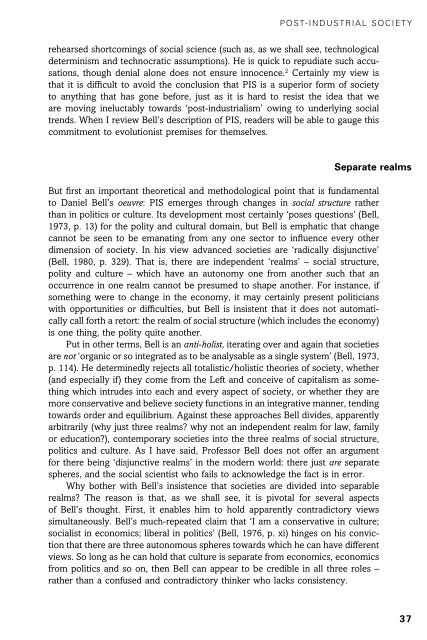Theories of the Information Society, Third Edition - Cryptome
Theories of the Information Society, Third Edition - Cryptome
Theories of the Information Society, Third Edition - Cryptome
Create successful ePaper yourself
Turn your PDF publications into a flip-book with our unique Google optimized e-Paper software.
POST-INDUSTRIAL SOCIETY<br />
1<br />
rehearsed shortcomings <strong>of</strong> social science (such as, as we shall see, technological<br />
determinism and technocratic assumptions). He is quick to repudiate such accusations,<br />
though denial alone does not ensure innocence. 2 Certainly my view is<br />
that it is difficult to avoid <strong>the</strong> conclusion that PIS is a superior form <strong>of</strong> society<br />
to anything that has gone before, just as it is hard to resist <strong>the</strong> idea that we<br />
are moving ineluctably towards ‘post-industrialism’ owing to underlying social<br />
trends. When I review Bell’s description <strong>of</strong> PIS, readers will be able to gauge this<br />
commitment to evolutionist premises for <strong>the</strong>mselves.<br />
Separate realms<br />
1<br />
1<br />
2<br />
1<br />
1<br />
But first an important <strong>the</strong>oretical and methodological point that is fundamental<br />
to Daniel Bell’s oeuvre: PIS emerges through changes in social structure ra<strong>the</strong>r<br />
than in politics or culture. Its development most certainly ‘poses questions’ (Bell,<br />
1973, p. 13) for <strong>the</strong> polity and cultural domain, but Bell is emphatic that change<br />
cannot be seen to be emanating from any one sector to influence every o<strong>the</strong>r<br />
dimension <strong>of</strong> society. In his view advanced societies are ‘radically disjunctive’<br />
(Bell, 1980, p. 329). That is, <strong>the</strong>re are independent ‘realms’ – social structure,<br />
polity and culture – which have an autonomy one from ano<strong>the</strong>r such that an<br />
occurrence in one realm cannot be presumed to shape ano<strong>the</strong>r. For instance, if<br />
something were to change in <strong>the</strong> economy, it may certainly present politicians<br />
with opportunities or difficulties, but Bell is insistent that it does not automatically<br />
call forth a retort: <strong>the</strong> realm <strong>of</strong> social structure (which includes <strong>the</strong> economy)<br />
is one thing, <strong>the</strong> polity quite ano<strong>the</strong>r.<br />
Put in o<strong>the</strong>r terms, Bell is an anti-holist, iterating over and again that societies<br />
are not ‘organic or so integrated as to be analysable as a single system’ (Bell, 1973,<br />
p. 114). He determinedly rejects all totalistic/holistic <strong>the</strong>ories <strong>of</strong> society, whe<strong>the</strong>r<br />
(and especially if) <strong>the</strong>y come from <strong>the</strong> Left and conceive <strong>of</strong> capitalism as something<br />
which intrudes into each and every aspect <strong>of</strong> society, or whe<strong>the</strong>r <strong>the</strong>y are<br />
more conservative and believe society functions in an integrative manner, tending<br />
towards order and equilibrium. Against <strong>the</strong>se approaches Bell divides, apparently<br />
arbitrarily (why just three realms? why not an independent realm for law, family<br />
or education?), contemporary societies into <strong>the</strong> three realms <strong>of</strong> social structure,<br />
politics and culture. As I have said, Pr<strong>of</strong>essor Bell does not <strong>of</strong>fer an argument<br />
for <strong>the</strong>re being ‘disjunctive realms’ in <strong>the</strong> modern world: <strong>the</strong>re just are separate<br />
spheres, and <strong>the</strong> social scientist who fails to acknowledge <strong>the</strong> fact is in error.<br />
Why bo<strong>the</strong>r with Bell’s insistence that societies are divided into separable<br />
realms? The reason is that, as we shall see, it is pivotal for several aspects<br />
<strong>of</strong> Bell’s thought. First, it enables him to hold apparently contradictory views<br />
simultaneously. Bell’s much-repeated claim that ‘I am a conservative in culture;<br />
socialist in economics; liberal in politics’ (Bell, 1976, p. xi) hinges on his conviction<br />
that <strong>the</strong>re are three autonomous spheres towards which he can have different<br />
views. So long as he can hold that culture is separate from economics, economics<br />
from politics and so on, <strong>the</strong>n Bell can appear to be credible in all three roles –<br />
ra<strong>the</strong>r than a confused and contradictory thinker who lacks consistency.<br />
37
















